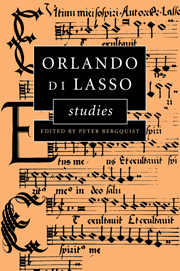Book contents
- Frontmatter
- Contents
- Preface
- List of abbreviations
- 1 Aspects of form in Orlando di Lasso's Magnificat settings
- 2 Orlando di Lasso and Andrea Gabrieli: two motets and their masses in a Munich choir book from 1564–65
- 3 Post-Tridentine liturgical change and functional music: Lasso's cycle of polyphonic Latin hymns
- 4 The salon as marketplace in the 1550s: patrons and collectors of Lasso's secular music
- 5 Lasso's “Standomi un giorno” and the canzone in the mid-sixteenth century
- 6 Lasso's “Fertur in conviviis”: on the history of its text and transmission
- 7 Orlando di Lasso and Rome: personal contacts and musical influences
- 8 Orlando di Lasso as a model for composition as seen in the three-voice motets of Jean de Castro
- 9 The madrigal book of Jean Turnhout (1589) and its relationship to Lasso
- 10 Modal ordering within Orlando di Lasso's publications
- 11 Correct and incorrect accentuation in Lasso's music: on the implied dependence on the text in classical vocal polyphony
- General index
- Index of Lasso compositions and printed sources
8 - Orlando di Lasso as a model for composition as seen in the three-voice motets of Jean de Castro
Published online by Cambridge University Press: 18 December 2009
- Frontmatter
- Contents
- Preface
- List of abbreviations
- 1 Aspects of form in Orlando di Lasso's Magnificat settings
- 2 Orlando di Lasso and Andrea Gabrieli: two motets and their masses in a Munich choir book from 1564–65
- 3 Post-Tridentine liturgical change and functional music: Lasso's cycle of polyphonic Latin hymns
- 4 The salon as marketplace in the 1550s: patrons and collectors of Lasso's secular music
- 5 Lasso's “Standomi un giorno” and the canzone in the mid-sixteenth century
- 6 Lasso's “Fertur in conviviis”: on the history of its text and transmission
- 7 Orlando di Lasso and Rome: personal contacts and musical influences
- 8 Orlando di Lasso as a model for composition as seen in the three-voice motets of Jean de Castro
- 9 The madrigal book of Jean Turnhout (1589) and its relationship to Lasso
- 10 Modal ordering within Orlando di Lasso's publications
- 11 Correct and incorrect accentuation in Lasso's music: on the implied dependence on the text in classical vocal polyphony
- General index
- Index of Lasso compositions and printed sources
Summary
Orlando di Lasso may without a doubt be considered the most illustrious composer of the second half of the sixteenth century. Thanks to the internationalization of music publishing, his music enjoyed a degree of distribution previously unknown. It was, however, not so much the quantity and variety of his music that was praised by composers, theoreticians, and poets of the day, but rather its quality and especially its expressivity and humanity. It comes then as no surprise to find that innumerable composers held up “le plus que divin Orlande” (Pierre de Ronsard) as the ideal example to be emulated. The degree of intensity of this imitatio is astonishing, permeating the most diverse lands and all aspects of the compositional process. Some composers borrowed texts from Lasso's motets. This is clear from the many cases where only one setting of a text exists other than his original. For example, Alexander Utendal (c. 1543/5–81), singer and Vice-Kapellmeister at the court of Archduke Ferdinand of Tyrol at Innsbruck, appropriated Lasso texts for two lighthearted secular motets, “Hispanum ad coenam” and “Deus qui bonum vinum creasti.” Some composers drew from specific Lasso collections for their own editions, either in imitation of the admired example or in competition with the master, or perhaps a bit of both. Utendal again provides a clear example: at the insistence of his patron, Ferdinand, the composer presented his Septem Psalmi poenitentiales (1570) as a kind of artistic counterpart to the “secret” Penitential Psalms composed by Lasso about 1559 for Duke Albrecht of Munich.
- Type
- Chapter
- Information
- Orlando di Lasso Studies , pp. 158 - 182Publisher: Cambridge University PressPrint publication year: 1999



